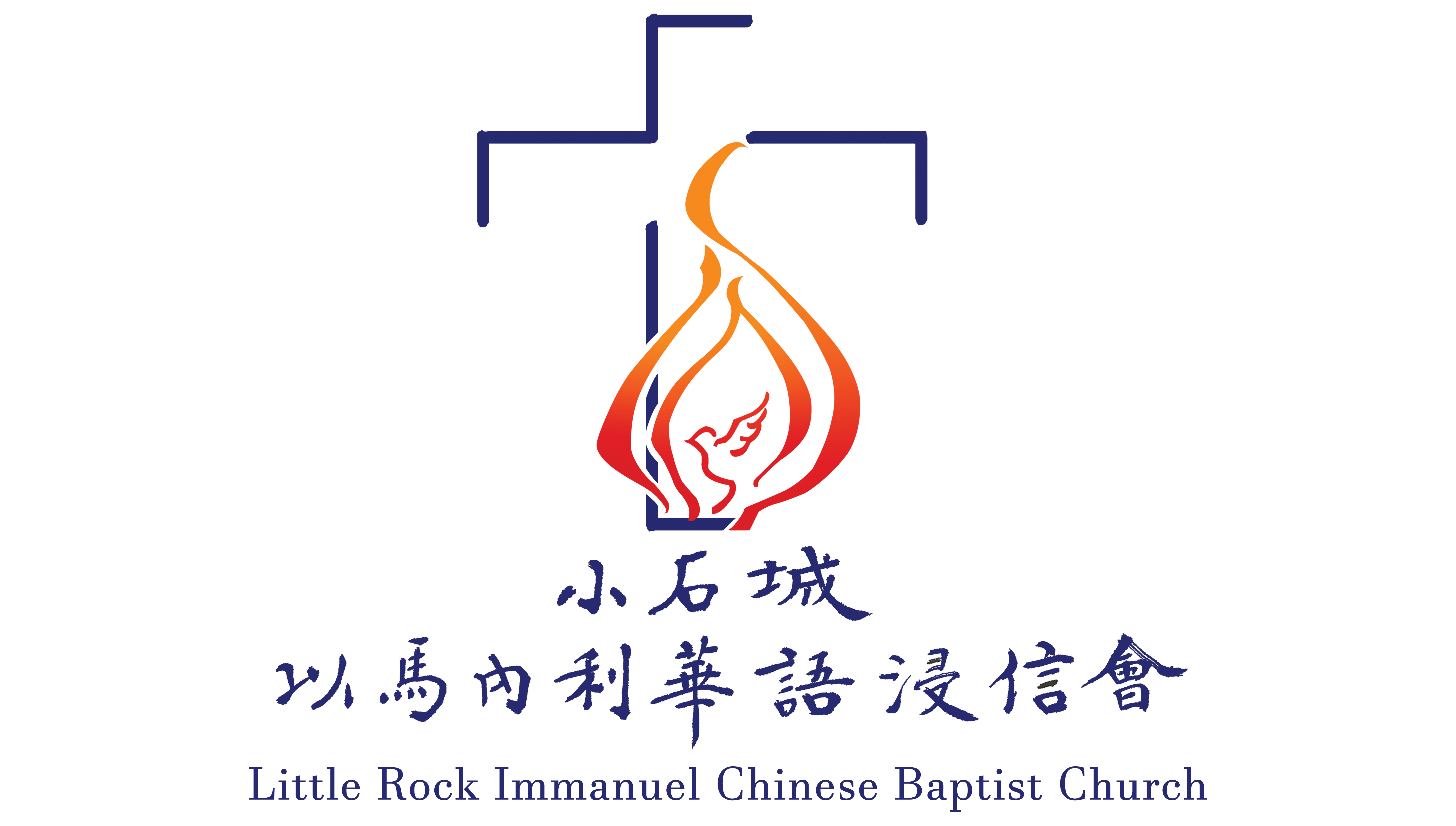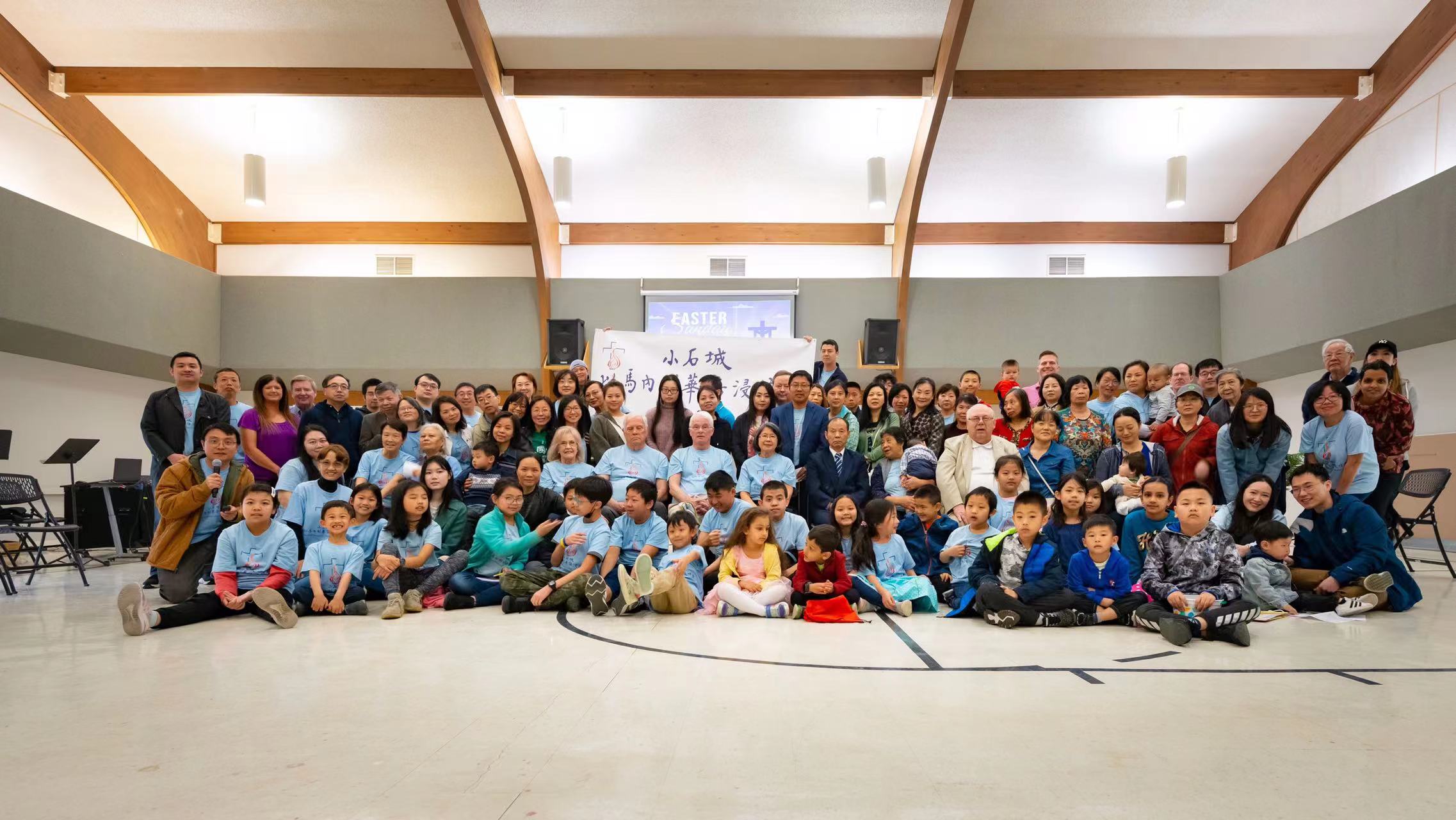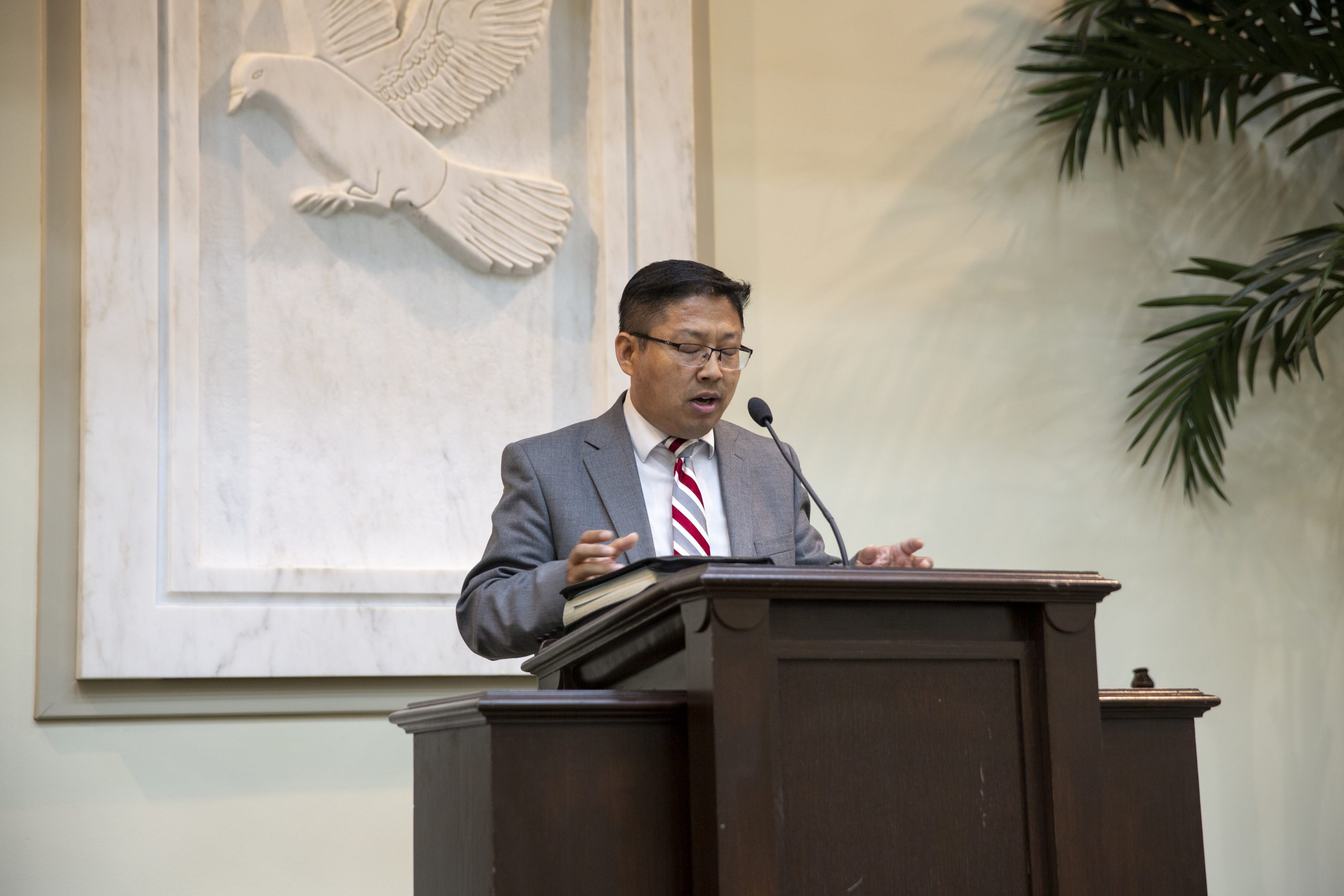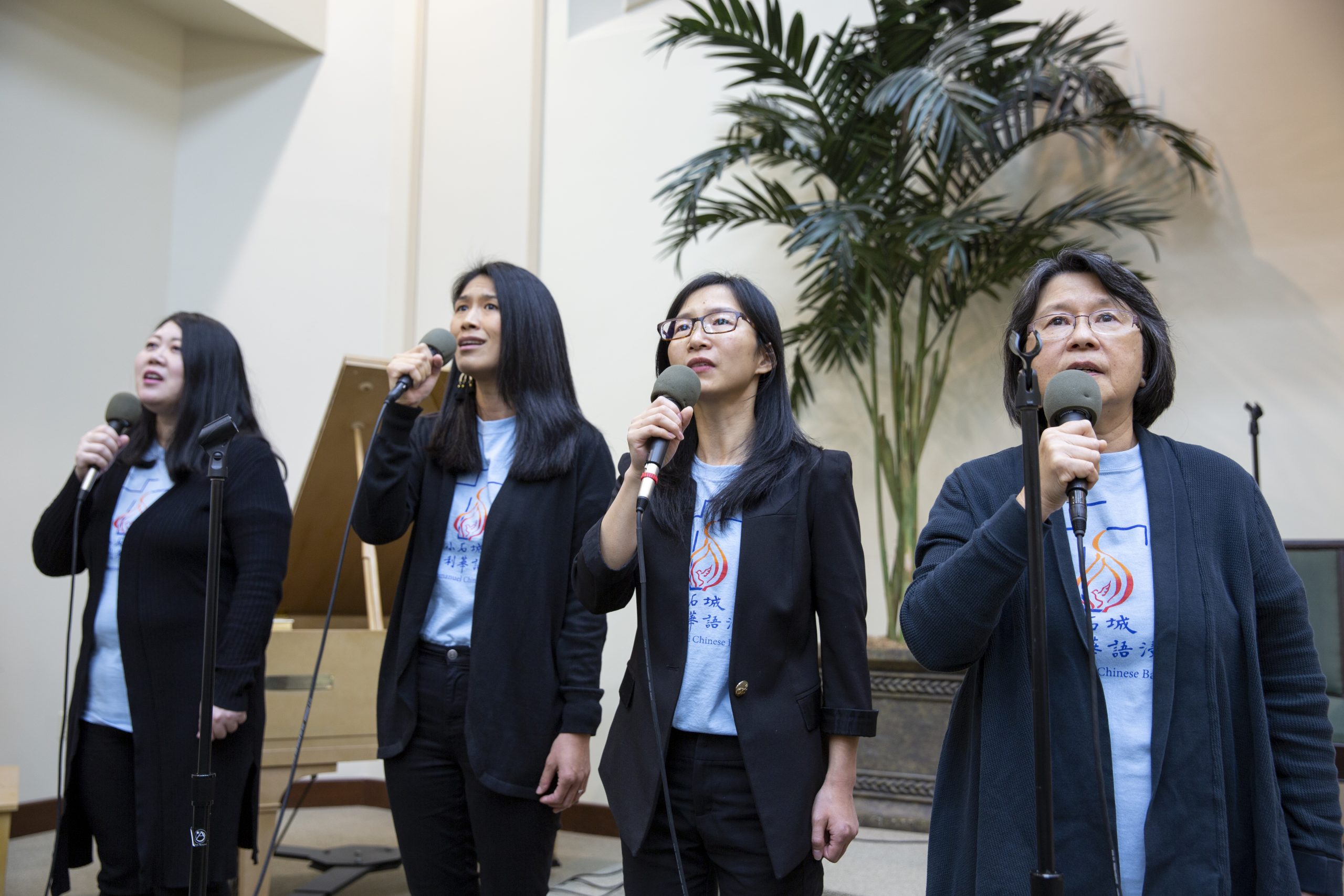亲爱的朋友,欢迎您浏览我们的网站。
“城造在山上,是不能隐藏的”(马太福音5:14下)。我们祈祷,求主使用小石城以马内利华语浸信会,使“这座造在山上的城”能“如日头出现、光辉烈烈”(士师记5:31),在新时代中为主发大光,照亮周围的人,使荣耀归于上帝。
我们诚挚地邀请您来参加我们教会的各项活动!让我们一同认识主,在祂的愛里彼此搀扶,共走天路。以马内利!
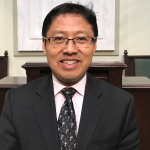 李春海牧师
李春海牧师
最新信息
10/12/25 牧者之言
初谈宋尚节
草湖基督教堂之行
3. 圣经植物园项目
草湖基督教堂的另一个特色是,他们正在建设的圣经植物园项目。走进教堂,可以看到这间教会于2025年春天刚刚启动的工程——“草湖基督教堂圣经植物园项目介绍”:
“主内平安!2025年,一场意义非凡的建造工程即将在我们的教堂周边拉开帷幕,这是神赐予我们的神圣使命,也是我们共同荣耀主名的宝贵契机,让我们齐心协力,投入其中,投身其中。
本教会计划在教堂旁边兴建一个充满圣经意境的植物园。这里将栽种许多圣经中富含深刻属灵意义的植物:橄榄树,象征生命与和平;葡萄树,象征主耶稣基督与门徒之间紧密的联系;无花果树,象征复兴与繁荣;还有生命树——预表主十字架上的牺牲。一片片郁郁葱葱的绿植,将讲述圣经的故事,彰显信徒生命如金银宝石般多结果子,彰显主的荣光与国度的荣耀。在绿意盎然之中,我们的信仰将得到更深的见证与传扬。园区已不仅仅是植物的天地,更是信仰的圣殿。
除了植物景观,园内还将设计精美的圣经故事雕塑与主题小品,激励信徒追寻圣经真理,默想神话语的深邃内涵;圣殿模型则能让我们重温仰慕神圣启示的庄严,激发内心对神的敬畏与向往。
该项目不仅具有深远意义,还将展示属灵激荡带来的灵感,让更多人感受到基督信仰的品质。未来,这里有望成为一处别具特色的旅游打卡点,吸引游客前来感受基督教文化与自然景观完美融合之美。这不仅能为乡村带来更多人气与活力,还能促进地方商贸、民宿、餐饮的发展,为改善农村社会做出积极贡献。我们的努力,将成为乡村发展的新动力,也会令人看到基督信仰的光辉与见证。
在此,我们诚挚邀请每一位弟兄姐妹踊跃参与,无论是奉献支持,还是投入时间精力,您的一份付出都将为这个项目注入强大的属灵力量。我们坚信,在神的带领和弟兄姐妹的共同守望下,这项工程必将顺利完成,神的荣耀必然显明!让我们携手共建,以爱为基石,以信为梁,在2025年,为我们的家园添砖加瓦,共同见证神的奇妙作为,也为我们的家园创造更美好的明天!”
教堂的墙上张贴着许多圣经植物的图片和解释,包括:
- 圣经中的树木:无花果树、橄榄树、皂荚树
- 圣经中的花卉:百合花
- 圣经中的草本:牛膝草、玫瑰花、薄荷
- 圣经中的水果:石榴、葡萄、芦苇
- 圣经中的香料:肉桂
- 圣经中的蔬菜:芫荽、苦菜、乳香
- 圣经中的农作物:红豆、稗子
这间教会筹款的方式很独特。教堂里设有一块白板,写着“草湖基督教堂植物园专款奉献公布栏”:上面列着人名和奉献金额。这种公布奉献款项的做法有圣经依据(比如民7:12-17;代上29:3-5;可12:41-44)。今日中国南方及港台的许多教会奉献弟兄姐妹的名字(或无名氏)公示出来,鼓励弟兄姐妹在财务上甘心奉献、积极参与神家事工。
我好奇地问王洪福牧师:“你们怎么会有要建圣经植物园这么美好的异象?”
王牧师很谦卑,只是面带微笑,没有正面回答我。退休的陈国恩老牧师则马上回答说:“是神给王牧师的灵感”。他还说:“主赐予王牧师的异象,我们一定要大力支持。”
现任牧师走在前、前任牧师走在后,两代牧者仍能同工同心合意地的这副场景非常美!尽管前任牧师已经退休,但仍紧随年轻牧师之后,全力支持神家事工。
草湖基督教会灵活拓展事工的理念值得学习。他们希望教会通过建立植物园可以为耶稣传福音,另一方面人们也能从这些植物中明白整本圣经中的福音真理。此外,在今日国家倡导美学享受的氛围下,人们也能得到美的滋养。
当被问到他们为何有如此大的信心和勇气去承担如此庞大的工程时,黄媛传道回答:“答案总比问题多,上帝总比困难大!”中国大陆的基督徒真有信心,他们信心的榜样值得在美国的华人教会效法!
真是感恩!草湖基督教会继承林振珍、宋尚节等属灵前辈的遗产:信心、勇敢、积极为主传福音等,并在新的时代将其发扬光大。 这次草湖教会之行受益匪浅,不仅有主里美好的团契,也获得许多新知识,学习了教会历史,品尝了宋尚节复兴的寻根盛筵,更从草湖基督教会靠主砥砺前行的广大心胸怀与国度视野中得到深深的激励。(未完待续)
10/12/25 Pastor’s Word
An Initiative Reflection on John Sung
(continued from the above)
Journey to Caohu Christian Church
3. The Biblical Botanical Garden Project
Another distinctive feature of Caohu Christian Church is their ongoing Biblical Botanical Garden project. Upon entering the church, one can see this project, which was just launched in the spring of 2025 — “Introduction to the Caohu Christian Church Biblical Botanical Garden Project”:
*“Peace in the Lord! In 2025, a highly significant construction project is about to unfold around our church. This is a divine mission granted by God, and a precious opportunity for us to glorify His name together. Let us unite in effort and dedication, fully investing ourselves in this undertaking.
Our church plans to establish a botanical garden adjacent to the church, imbued with the spiritual imagery of the Bible. The garden will feature many plants with profound biblical significance: olive trees, symbolizing life and peace; grapevines, symbolizing the close relationship between Jesus Christ and His disciples; fig trees, representing revival and prosperity; and the tree of life, prefiguring the sacrifice on the cross. Lush greenery will narrate biblical stories, demonstrating how the lives of believers can bear fruit like gold and silver, reflecting the glory of the Lord and His kingdom. Amidst this verdant splendor, our faith will gain deeper witness and promotion. The garden will not merely be a collection of plants, but a sanctuary of faith.
In addition to the plant displays, the garden will feature finely crafted biblical story sculptures and themed installations to inspire believers to seek biblical truth and meditate on the depth of God’s Word. A model of the temple will allow visitors to relive the awe of divine revelation, fostering reverence and longing for God.
This project is not only of profound spiritual significance, but also aims to showcase the inspiration arising from spiritual awakening, allowing more people to experience the essence of the Christian faith. In the future, it is expected to become a unique tourist destination, attracting visitors to appreciate the harmony of Christian culture and natural beauty. This will not only bring vitality to the local village but also promote local commerce, homestays, and dining, contributing positively to rural society. Our efforts will become a new driving force for village development and demonstrate the radiance and testimony of the Christian faith.
Here, we sincerely invite every brother and sister to participate enthusiastically. Whether through financial contributions or by offering time and effort, your involvement will infuse this project with powerful spiritual energy. We firmly believe that under God’s guidance and the joint watchfulness of our church family, this project will be successfully completed, and God’s glory will be revealed! Let us work hand in hand, building with love as our foundation and faith as our framework, adding bricks and tiles to our home in 2025, witnessing God’s wondrous deeds, and creating a brighter future for our community!” *
On the church walls, many pictures and explanations of biblical plants are displayed, including:
- Trees in the Bible: fig tree, olive tree, carob tree
- Flowers in the Bible: lily
- Herbs in the Bible: achyranthes, rose, mint
- Fruits in the Bible: pomegranate, grape, reed
- Spices in the Bible: cinnamon
- Vegetables in the Bible: coriander, bitter herbs, frankincense
- Crops in the Bible: red beans, millet
The church has a unique fundraising approach. Inside the church is a whiteboard labeled “Caohu Christian Church Botanical Garden Donation Board”, listing the names of donors and their contributions. This public display of donations is biblically based (see Num. 7:12–17; 1 Chron. 29:3–5; Mark 12:41–44). Today, many churches in southern China and Hong Kong/Taiwan display the names (or anonymity) of contributing brothers and sisters to encourage willing and generous participation in God’s work.
With curiosity, I asked Pastor Wang Hongfu, “How did your church come up with such a beautiful vision of building a Biblical Botanical Garden?”
Pastor Wang humbly smiled and did not respond at once. Retired Pastor Chen Guoen immediately answered, “It is God who inspired Pastor Wang.” He also added, “We must wholeheartedly support the vision God has given Pastor Wang.”
It was beautiful to witness the current pastor leading the way while the retired pastor followed, two generations of pastors working together in unity. Even though the former pastor had retired, he still followed closely behind, fully supporting the work of God’s house.
The flexible approach to ministry at Caohu Christian Church is commendable. They hope that through the botanical garden, the church can both proclaim the gospel of Jesus and allow people to understand the gospel truths throughout the Bible via these plants. Moreover, in today’s cultural emphasis on aesthetic enjoyment, people can also be nourished by beauty.
When asked why they had such great faith and courage to undertake such a massive project, Minister Huang Yuan replied, “Answers are always more than questions; God is always greater than the difficulties!” Chinese Christians indeed have remarkable faith, and their example is worthy of imitation in Chinese churches in the United States.
Truly, we are grateful! Caohu Christian Church carries forward the heritage of spiritual predecessors such as Lin Zhenzhen and John Sung — faith, courage, and active evangelistic work — and continues to promote these virtues in a new era. This visit to Caohu Church was extremely enriching, not only offering wonderful fellowship in the Lord, but also providing abundant knowledge, church history learning, a taste of the revivalist roots of John Sung, and deep inspiration from the church’s broad vision and steadfast reliance on the Lord.
(To be continued…)
10/5/25 牧者之言
初谈宋尚节
(接上文)
草湖基督教堂之行
2. 林振珍纪念室
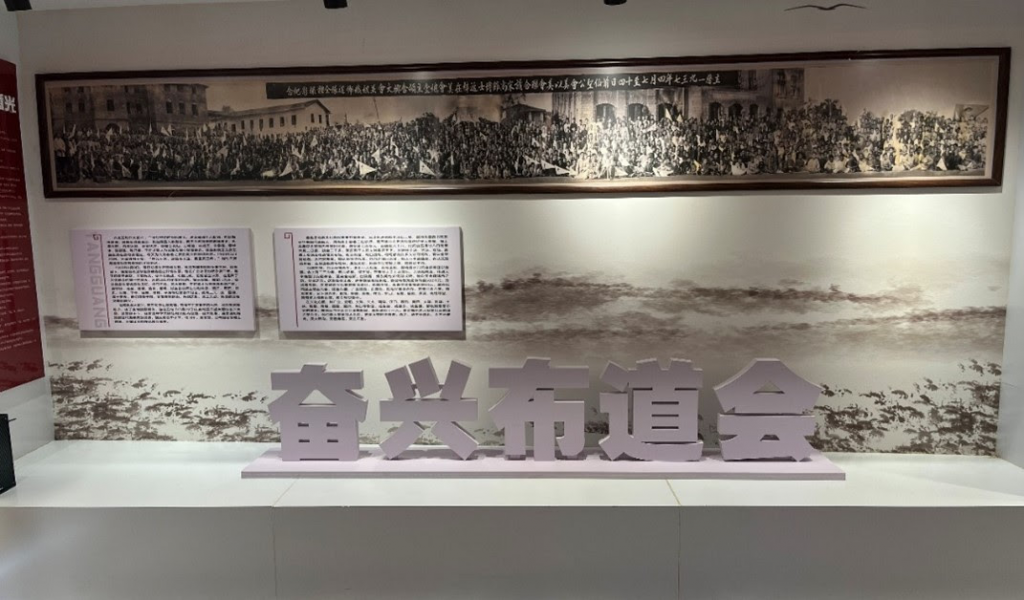
宋尚节奋兴会布道会
林振珍纪念馆里有一个专栏,介绍宋尚节奋兴布道会,标题:主曆一九三七年四月七日至十四日普仙聖公會美以美聯合會請宋尚節博士返梓在美會總堂主領奮興大會並組織佈道隊全體攝影紀念。上图照片拍摄于 1937 年,当时宋尚节在莆田举办了一场奋兴会。照片中有上千人参加,拍摄技术在当时已相对清晰,宋尚节的脸部轮廓都清晰可见。
黄媛传道介绍说,当时一位老人回忆:“他亲眼见到宋尚节在圣路加医院搭台讲道。讲道结束后,宋尚节邀请需要祷告的人留下,他便为他们一一祷告。留下的人中有身体有疾病的,也有瘸腿的。宋尚节特别为其中两人祷告,其中有一个人当他得医治后,心里还很怀疑,觉得不可信。他带着怀疑的态度说:‘太神奇了,我的腰竟然直了!’他走了几步,忽然想起说:‘我的拐杖呢?’眼睛往后找,于是他的腰一下子又弯下去,再也站不起来了”。
施伟《献祭者》中也讲到,这位老人当时是十三岁姓林的小男孩:“下午,爸爸带他去见主仆宋尚节,他拉着我的手,摸着我的头,问我读经祷告的情况。我问他:‘为什么被按手的,有人痊愈?有人不痊?’他坦然说:‘因为被按手的人的信心不同,所得的医治也不同。’爸爸请他为我祷告,他祷告毕,我们告辞而去。”
宋尚节就像一团火,他走到哪里,就给哪里带去复兴。
退休的陈国恩老牧师补充说:“照片里有人拿旗,你们知道那是干什么的吗?那是布道旗。拿布道旗的人说明他们领受了呼召,都要去为主布道传福音的。”
上图照片下面的文字不是讲1937年宋尚节带领的大复兴,而是在讲1909年兴化的大复兴的。展厅为什么要这样设计呢?他们想要说明的是,为什么莆田教会能出宋尚节呢?因为莆田有培养宋尚节的土壤。这块土壤中主要的事件是1909年兴化的大复兴。文字是这样描述的:
兴化五旬节大复兴,二十世纪初的兴化教会,过分强调个人影响,仰仗物质刺激,忽视圣灵的感动,其结果虽入教者众,而不少却是来吃教依教者,外表兴旺,内里冰凉,识者忧之,普鲁士夫妇 (Dr and Mrs. William Brewster)……宋学连……等人为此率众禁食祷告,美籍传教士万明治女士 (Missionary Miss Winnie Wilson) 函告其在美母亲撒拉,每天为兴化教会之灵性复兴而恳切祈求。1909年3月23日,万母致书于女:“神允所求,深信书未达,而圣灵已降。”[2] 当时只有海运每封信五星期后才能到达。
1909年4月9日,莆田总堂举行受难礼拜,林鸿万痛表耶稣受难苦况,闻着泪下,
晚聚会有道学生薛明春站起立忏悔认罪,曾在广业牧区分肥杂费二元,痛苦自责,并退款,全场听众,受圣灵感动,心如刀扎,纷纷起来认罪,这是将于兴化教会的第一把火。
结果,台下许多人老少都站起来认罪悔改。宋尚节在《灵力激光》一书中也提到这一幕,并记载当时在这场聚会里,教会共收回五百个足球——那些原本被孩子们偷走的足球。当时宋尚节9岁。他于1922年美国下乡布道期间梦到这次兴化大复兴的场景,而且分毫不差。十七年后,在1937年11月8日,当宋尚节返回中国来到婶婶家时,这个兴化大复兴的场景再次如放电影一样一幕幕浮现在他眼前。[3]
可以说,这场复兴极大影响了宋尚节,使他后来每一场奋兴会都强调认罪悔改,并深刻改变了许多人。所以,当有人问宋尚节的奋兴会为什么会大有能力呢?其中一个关键原因就是“认罪悔改”。
[1] 施玮:《献祭者——宋尚节传》(The Sacrifice: John Sung),洛杉矶:灵性文艺,2019,543.
[2] 施玮:《献祭者》(The Sacrifice),69-71。
[3] 施玮:《献祭者》(The Sacrifice),239-241。
An Initiative Reflection on John Sung
(continued from the above)
Journey to Caohu Christian Church
2. Lin Zhenzhen Memorial Room
John Sung Revival Meetings
In the Lin Zhenzhen Memorial Hall, there is a special column introducing John Sung’s revival crusades. The title reads: “From April 7 to 14, 1937, the Episcopal Church of Puxian, together with the United Methodist Episcopal Church, Invited Dr. John Sung to Return to His Hometown to Lead a Revival Crusade at the Main Hall of the American Church and Organized the Evangelistic Team, All Captured in a Commemorative Photograph.” The photograph above was taken in 1937, when John Sung held a revival meeting in Putian. Over a thousand people attended, and the photographic technology of the time was relatively clear, making John Sung’s facial features easily recognizable.
Minister Huang Yuan introduced that at the time, an elderly man said: “He personally saw John Sung preaching on the stage at St. Luke’s Hospital. After the sermon, John Sung invited those who needed prayer to stay behind, and he prayed for each of them individually. Among those who remained were people with illnesses, including some who were lame. John Sung prayed especially for two of them. One of them, after being healed, still doubted in his heart, thinking it was unbelievable. With a doubtful attitude, he said, ‘Amazing! My back is straight!’ He took a few steps, then suddenly remembered and said, ‘Where is my cane?’ As he looked back, his back immediately bent again, and he could no longer stand.”
Shi Wei’s book Sacrifice also recounts that this elderly man was a thirteen-year-old boy surnamed Lin:
“In the afternoon, my father brought me to see the Lord’s servant John Sung. He held my hand, touched my head, and asked about my Bible reading and prayer life. I asked him, ‘Why do some people get healed when the hands are laid on them, while others do not?’ He replied calmly, ‘Because the faith of those upon whom hands are laid differs, and the healing they receive differs as well.’ My father asked him to pray for me. After he prayed, we took our leave.”[1]
John Sung was like a fire; wherever he went, he brought revival.
Retired Pastor Chen Guoen added: “In the photograph, some people are holding flags. Do you know what those flags are for? They are evangelistic flags. Those holding them had received the call and were committed to preaching the Gospel for the Lord.”
The caption below the photograph does not describe the 1937 revival led by John Sung, but instead refers to the 1909 revival in Xinghua. Why is the exhibition designed this way? The curators wanted to show why the Putian church produced John Sung: because Putian had the spiritual soil to cultivate him. The most significant event in this soil was the 1909 Xinghua revival. The description reads:
During the Pentecostal revival in Xinghua, at the beginning of the twentieth century, the church overly emphasized personal influence, relied on material stimulation, and neglected the work of the Holy Spirit. As a result, although many joined the church, many did so merely for the benefits of religion. Outwardly the church seemed prosperous, but inwardly it was cold. Those who understood this worried. Mr. and Mrs. William Brewste…… Song Xuelian……, and others led the congregation in fasting and prayer. Missionary Miss Winnie Wilson in America wrote to her mother Sarah Wilson, earnestly praying each day for the spiritual revival of the Xinghua church. On March 23, 1909, Sarah wrote to her daughter: “God has granted the request; I firmly believe that even if the letter has not arrived, the Holy Spirit has already descended.” At that time, mail by sea took five weeks to arrive.
On April 9, 1909, Putian Main Hall held a Good Friday service. Lin Hongwan vividly described the suffering of Jesus, moving the congregation to tears. In the evening meeting, a theological student, Xue Mingchun, stood up to confess his sins. He returned two yuan that had been improperly collected in the Guangye parish, expressing deep remorse. The entire audience, moved by the Holy Spirit, felt as if their hearts were pierced by a knife, and many stood up to repent. This was the spark of the first revival in the Xinghua church.
Many young and old in the audience stood to repent. John Sung also mentioned this scene in his book The Power of the Spirit, noting that the church collected back five hundred soccer balls—those originally taken by children. At the time, John Sung was nine years old. During his 1922 rural evangelistic trips in the United States, he dreamed of the Xinghua revival scene, recalling it in detail.[2] Seventeen years later, on November 8, 1937, when John Sung returned to China and visited his aunt’s home, the revival scene once again appeared vividly before his eyes, like a movie playing.[3]
This revival greatly influenced John Sung, shaping his later crusades to emphasize confession and repentance, profoundly transforming many people. Therefore, when asked why John Sung’s revival meetings were so powerful, one key reason was the practice of confession and repentance. (to be continued)
[1] Shi Wei, The Sacrifice: John Sung (Los Angeles: Spiritual Literature and Arts Press, 2019), 543.
[2] Shi, The Sacrifice, 69-71.
[3] Shi, The Sacrifice, 239-241.
9/28/25 牧者之言
初谈宋尚节
(接上文)草湖基督教堂之行
2. 林振珍纪念室
2025年6月8日在草湖教堂崇拜结束后,王洪福牧师的妻子黄媛传道带领我们来到教会附堂的林振珍纪念馆,为我们详细讲解了草湖作为莆仙福音发源地的历史。用王牧师的话说:“如果没有林振珍在莆田开创的福音事工及复兴种子,就不可能有后来宋尚节在世界各地带领的复兴运动”。
林振珍(1823-1877,原名式端,别名聘儒,祖籍惠安,先祖以渔为业后迁居南日岛草湖村落户)是兴化(现称“莆田”)地区第一位基督徒、第一位牧师、他的家庭是第一个基督化的家庭,不但全家归信基督,且全家作牧师。1843年林振珍迎娶惠安女林引宋为妻。
1847年美以美会(即卫理公会,卫斯理公会源于约翰·卫斯理,他们早年的宣教做得非常出色,可惜近些年在欧美的许多卫理公会偏离圣经真理,接受同性婚姻,向世俗罪恶妥协)派柯林斯((Judson Dwight Collins)、怀特(Moses Clark White)及麦利和(Robert Samuel Maclay)牧师来华到福州宣教,最初10年内(1847-1856)没有一位信主的。而柯、怀两位也因健康问题回国,只有麦利和及以后续到的明正理及薛承恩 (Nathan Sites, 1830-1895) 等牧师继续在苦传。1856年,麦牧师建茶亭的真神堂及仓前山的天安堂。1857年陈永高 (Ting Ang, the first convert) 第一家信主 。
黄媛传道向我们介绍:
林振珍的信主经历是这样的,在 1863年1月1日(同治元年11月12日),他在福州的一个教堂——小岭堂外面摆地摊卖药膏时,听到教堂里传出来的声音,就闻声而入,进去听到关于耶稣的信息。他心里就有一个感动:“耶稣是谁?耶稣能救人吗?耶稣能不能救我?”
为什么他这样渴望得到耶稣的拯救?因为他当时吸食鸦片,受鸦片折磨甚苦,想得到摆脱和释放。当时劝士(exhorter)李振美向他传福音。他用了两周时间,把鸦片戒掉了。为什么这么快?因为在这两周,他一边祷告,一边读《新旧约圣经》、《使徒信经》、《依经问答》等。在祷告读经过程中,他忘记了鸦片瘾,就自然戒掉了。
当戒掉鸦片后,他想到:“我接受了福音,可我的老家、身边的人还没有信耶稣。当时莆田也有很多人吸食鸦片。” 他心里有负担,要把耶稣介绍给他们。林振珍在福州 “浴火重生” 的经历燃起他那颗爱同胞的心。他深信:唯有基督才能救同胞、救中国。 于是,他从归信基督那刻开始就立定心志:一生唯传基督。
• 回家乡传道及全家事奉
他信耶稣后,第一站就回到家乡——莆田南日草湖。传福音的过程很艰难,但很感恩,他一家人都因他传福音而信了耶稣,接着信主的人数不断加增。1865年,南日信徒就增加到35人。
林振珍带两个儿子林明山、林明泉去省城。当时南日岛草湖比较偏僻,很难走出去,他们到了福州的英华学院——相当于今天的神学院。在那里,他们悔改重生,奉献给上帝,成为牧师。
林振珍的家庭,不单是基督化的家庭,更可以说是牧师化的家庭。因为他的两个儿子后来奉献当了牧师,两个女儿也嫁给牧师成为牧师娘。
当时是封建社会,男女有别。男士只能与男士交往,女士只能与女士相处。所以林振珍只能向男人传福音。那女士怎么办?就由他的妻子林引宋(原姓宋,嫁给林牧师后改姓林,当时中国习俗有贯夫姓的传统)向妇女传福音。她刚结婚时,还没有信耶稣。但她看到丈夫信主后生命改变,就深受感动,也信了耶稣。在他们的记录中写到,林师母开始传福音时,第一年就带领六位妇女信耶稣。她成了当地首位女宣道师。后来每年都有许多人因她所传的道信了耶稣。她无条件跟随林牧师,无论林牧师走到哪里,她都无条件地支持他传福音的道路。
• 牧养与教会建造
在牧养方面,林牧师既重视数量,也重视质量。1863–1870年,各方面数据都在增长。不仅人数多,在质量上严格把关。当时美以美会将入教分为三个等级:
– 慕道友 (hearer) ——愿意加入教会,要学习,预备成为基督徒。
– 试教友 (probationer) ——三个月内参加教会崇拜,要拒绝偶像,能够背诵《主祷文》、《十诫》以及《使徒信经》。
– 正式教友 (member) ——认真学习《试教友手册》、《依经问答》,并通过考试,接受洗礼,才接纳为正式教友。
林牧师自己因《依经问答》受感动,他传福音时也常用这本书。如此,信仰才真正建立在基督的磐石上。
黄传道评价到:对比今天许多的教会,当一听有人要信耶稣,我们就把门槛降低,没有在质量上严格把关,以致很多人在风吹雨打中容易跌倒,甚至离开上帝。
• 团队建设与宣教事工
林牧师是传教士,他精通三种语言:莆田话、闽南话、福清话。他组建第一支宣教团队,这个团队分成两个小分队:
一队“后卫队”——留下固本强身,牧养教会;
一队“先锋队”——出去拓荒宣教。
到1871年,兴化信徒人数达到774人。福州全年议会的人数是2139人,兴化占三分之一多。他走过泉州、永春、莆田、福州、福清等地传扬福音。其中,福清的福音就是他第一个传进去的。2023年福清教会举行福音传入160周年纪念,他被尊为开山鼻祖。
《福州年议会》中记载:
“人所不能往之地,牧师无不乐往;人所不能为之事,牧师无不乐为。所处之危境,殆非人履,与保罗有相似之处,而牧师安之若素。盖为道舍身,甘之若饴,故能历险若夷也。”
• 逼迫与受苦
在传教过程中,林牧师经历过许多逼迫。在江头牛田一带,他被人剥光衣服、打得遍体鳞伤,手指差点被砍断,石头如雨点般打来。他赤身回家,仍然欢喜能为主受苦。后来,他又与孙西川、杨得权到兴化城、惠安县传道,再次遭受毒打和逼迫。在泉州城更是被成千上万的人拳打脚踢,衣服撕碎,浑身是伤,几次被打倒在地,痛得无法起身。最后有一位七十多岁的老人出面劝阻,才得以脱身。
他还曾在福清县被地方官员拘捕,以“传洋教、迷惑人心”为罪名,打了两千小板,血流满地,痛不欲生。他在祷告中把性命交托给主,立志:“就是打死也要传耶稣的道。”官府因此大怒,将他关进监狱。三日后,由麦利和牧师的交涉,经领事向通商局照会,县衙才将他释放。麦利和夫人日记中讲到:“那时见他遍体鳞伤,鞭痕犹在,半生半死,状实堪怜。虽然这样,尚引用保罗的话说:‘我不以性命为念,也不看为宝贵,只要证明上帝……恩惠的福音。足矣。’”
• 人才培养与本色化实践
林振珍牧师重视人才培养。他花六年培养了23位宣讲师。十年间,他们建立了29所教会。1875年,林牧师决定不再领差会的工资,凭信心生活。他们所建立的教会基本上都是本地信徒自养、自立、自传,没有依靠外来宣教士。当时,许多信徒奉献房屋、土地和金钱,真正实现了三自原则。可以说,今天所说的“本土化”,在160多年前林振珍那里就已经开始了。他将要归天家时,甚至连买棺材的钱都没有。文字材料记载:“1877年3月23夜,先生见荣光满室,知死期至,侯主来接纳灵魂。问:今夜有月乎?师娘曰:无也。乃起,祷告谢主神恩。师娘曰:汝若过世现无棺,将若何?先生叹曰:我素轻财重义,今至此依不顾羞耻,我作信上省求乞多少钱文收埋。西教士薛承恩(Nathan Sites,1830 — 1895)、曾大辟 (D.W.Chandler)、武林吉(Franklin Ohlinger,1845年—1919年)见书,流泪捐集钱银帮助。先生寄信鸣谢。”
• 信仰遗产
我们相信义人的后裔必蒙福。 神赐福他的后裔,成为各行各业的精英,基本上每一代都有牧师、传道。
莆田教会也有二十个“第一”:第一张报纸、第一所学校、第一所医院、第一所麻风病院等等,对社会影响深远。
莆田还有自己的文字——罗马兴化字,是由宋尚节的父亲宋学联与宣教士蒲鲁士(William, 1864–1916)一起创制,方便用莆田话读写圣经。比如《约翰福音》第一章,就能用罗马字拼写出来。学习一月即可拼读,三月即可写信彼此往来。可惜现在会的人很少了。王洪福牧师刚好在去年找了一位年纪较大的长辈学习,结果学完之后那位老姊妹就归天家了。不过感恩的是,相关的学习材料却保留下来了。
(未完待续)
| (continued from the above) Journey to Caohu Christian Church 2. Lin Zhenzhen Memorial Hall On June 8 of 2025, after the worship service at Caohu Church, Pastor Wang Hongfu’s wife, Minister Huang Yuan, led us to the Lin Zhenzhen Memorial Hall attached to the church. She provided a detailed explanation of the historical significance of this site as the birthplace of the Gospel in the Putian-Xian region. As Pastor Wang remarked, “Without the evangelistic work and revival seeds sown by Lin Zhenzhen in Putian, the later revival movements led by John Sung around the world would not have been possible.” Lin Zhenzhen (1823–1877, birth name Shi Duan, also known as Pinru, ancestral home in Hui’an; his ancestors were originally fishermen and later settled in Caohu Village on Nanri Island) was the first Christian and first pastor in the Xinghua region (now called Putian). His family was the first Christian household in the area; the entire family not only believed in Christ but also served as pastors. In 1843, Lin Zhenzhen married Lin Yinsong from Hui’an. In 1847, the Methodist Episcopal Mission (i.e., the Methodist Church, originating from John Wesley, did outstanding missionary work in its early years. Unfortunately, in recent years, many Methodist churches in Europe and America have deviated from biblical truth, accepting same-sex marriage and compromising with worldly sins) sent pastors Collins, White, and Robert Samuel Maclay to Fuzhou for missionary work. During the first ten years (1847–1856), none of their efforts initially resulted in converts. Collins and White returned home due to health reasons, leaving Maclay and subsequent missionaries, including Ming Zhengli (?) and Nathan Sites, to continue the arduous work. In 1856, Pastor Maclay established Zhenshentang at Chating and Tian’an Church at Cangqianshan. In 1857, Ting Ang became the first convert.[1] Minister Huang introduced Lin Zhenzhen’s own conversion experience: On January 1, 1863 (the 12th day of the 11th month in the first year of Tongzhi), while selling ointments outside Xiaoling Church in Fuzhou, he heard voices from inside the church and went in. There he heard the message of Jesus and felt deeply moved: “Who is Jesus? Can He save people? Can He save me?” At the time, Lin Zhenzhen was addicted to opium and suffered greatly. He longed for deliverance. Through the exhortation of Li Zhenmei and two weeks of prayer, reading the Old and New Testaments, the Apostles’ Creed, and the Catechism, he naturally overcame his addiction, forgetting the craving during his devoted study and prayer. After overcoming opium, he felt a burden for his hometown and family, many of whom were still addicted and had not yet believed in Jesus. His “rebirth through fire” experience in Fuzhou ignited a heart of compassion for his fellow countrymen, firmly believing that only Christ could save them and China. From that moment, he resolved to dedicate his life entirely to preaching Christ. Preaching in His Hometown and Family Ministry After his conversion, Lin Zhenzhen first returned to his hometown, Caohu, Nanri Island, Putian. The evangelistic work was difficult, but his entire family came to faith through his preaching. By 1865, there were 35 believers in Nanri. He took his two sons, Lin Mingshan and Lin Mingquan, to study at Yinghua Academy in the provincial capital (equivalent to a modern seminary). There, they repented, were reborn, and dedicated themselves to God, eventually becoming pastors. Lin Zhenzhen’s family was not only Christianized but also “pastorized,” as both sons became pastors and his daughters married pastors. During the feudal era, men and women were segregated. Lin Zhenzhen could only preach to men, while his wife, Lin Yinsong (who became a believer after witnessing her husband’s transformed life), ministered to women. She became the first female minister in the region. In her first year of ministry, she led six women to faith in Christ, and many more in subsequent years. She unconditionally supported her husband’s evangelistic work wherever he went. Pastoral Care and Church Building Lin Zhenzhen emphasized both quantity and quality in ministry. Between 1863 and 1870, the church grew steadily. The Methodist Episcopal Mission classified church membership in three levels:Hearer: Willing to join the church and learn.Probationer: Attended worship for three months, renounced idols, and memorized the Lord’s Prayer, the Ten Commandments, and the Apostles’ Creed.Member: Studied the Catechism, passed exams, and was baptized.Lin Zhenzhen often used the Catechism in his preaching. This rigorous approach ensured that faith was established firmly on the foundation of Christ. Pastor Huang noted that unlike many churches today, which lower the threshold for conversion, Lin Zhenzhen ensured that believers were well-grounded, preventing many from falling away. Team Building and Missionary Work Fluent in three languages—Putian dialect, Minnan dialect, and Fuqing dialect—Lin Zhenzhen formed the first missionary team, divided into two groups:Rear Guard: To maintain the church and nurture believers.Vanguard: To pioneer new evangelistic work. By 1871, the number of believers in Xinghua reached 774, accounting for over one-third of the 2,139 attendees in the Fuzhou annual conference. Lin Zhenzhen preached in Quanzhou, Yongchun, Putian, Fuzhou, and Fuqing, with Fuqing being the first city he evangelized. In 2023, Fuqing Church celebrated the 160th anniversary of the Gospel’s arrival, honoring him as its founding father. The Fuzhou Annual Conference recorded: “Pastors joyfully go where others dare not, willingly do what others cannot. In perilous circumstances, they remain calm, resembling Paul, dedicating themselves wholly to the Gospel. Their willingness to sacrifice and endure hardships enables them to face danger with ease.” Persecution and Suffering During his ministry, Lin Zhenzhen faced severe persecution. In Jiangtou and Niutian, he was stripped, beaten, and nearly had his fingers severed, with stones raining upon him. He returned home naked but rejoiced in suffering for the Lord. He continued evangelizing in Xinghua city and Hui’an County alongside Sun Xichuan and Yang Dequan, suffering further beatings. In Quanzhou, he was attacked by thousands, his clothes torn, and left unable to rise. Only an elderly man intervened to stop the assault. In Fuqing County, he was imprisoned by local officials for “preaching foreign religion and misleading people,” receiving 2,000 lashes. Bleeding profusely, he entrusted his life to the Lord, vowing, “Even if I die, I will preach Jesus’ message.” After three days, through Pastor Maclay’s negotiation and consular intervention, he was released. Maclay’s diary notes: “He was covered in wounds, whip marks still visible, half-dead, yet quoted Paul: ‘I do not consider my life precious, only that God’s grace in the Gospel be proven.’” Talent Development and Indigenization in Practice Pastor Lin Zhenzhen valued the training of leaders. Over six years, he trained 23 evangelists. In ten years, they established 29 churches. In 1875, Pastor Lin decided to no longer receive a salary from the mission and to live by faith. The churches they founded were largely self-supported, self-governing, and self-propagating, relying neither on foreign missionaries nor outside resources. At that time, many believers contributed houses, land, and money, truly realizing the principles of the “Three-Self” church. It can be said that what is today called “indigenization” had already begun with Lin Zhenzhen more than 160 years ago. When he was about to return to the Lord, he did not even have money to buy a coffin. Records state: “On the night of March 23, 1877, the gentleman saw glory filling the room, and knew that the time of his death had come, and that the Lord would receive his soul. He asked, ‘Is there a moon tonight?’ His wife replied, ‘No.’ He then got up, prayed, and thanked the Lord for His grace. His wife asked, ‘If you pass away without a coffin, what will you do?’ He sighed and said, ‘I have always valued righteousness over wealth. Now that the time has come, I will not care about shame; I will send a letter asking for some money to bury me.’ Seeing the letter, the Western missionaries Nathan Sites (1830–1895), D.W. Chandler, and Franklin Ohlinger (1845–1919) wept and collected money to help. The gentleman sent letters to express his gratitude.” Legacy of Faith The descendants of the righteous are blessed. God blessed Lin Zhenzhen’s descendants, many of whom became pastors and evangelists across generations. Putian churches also achieved numerous “firsts”: the first newspaper, school, hospital, and leprosy hospital, leaving a profound social impact. The region even developed its own Romanized Putian script, co-created by John Sung’s father, Song Xuelian, and missionary William Purcell (1864–1916), allowing easy reading and writing of Scripture in the local dialect. For example, the first chapter of John could be spelled phonetically, learnable in one month, and letters could be written within three months. Unfortunately, very few people know it now. Just last year, Pastor Wang Hongfu happened to find an elderly senior to learn from, and after the learning was completed, that older sister went home to be with the Lord. Yet, thankfully, the related learning materials have been preserved. (to be continued) [1] “Ting Ang, the First Convert,” Pitts Theology Seminary, https://dia.pitts.emory.edu/image_details.cfm?ID=2366, accessed September 19, 2025. |
9/21/25 牧者之言
初谈宋尚节
(接上文)
草湖基督教堂之行
- 崇拜与团契交通
2025年6月8日早晨7:30,我们从莆田市的笏石镇启程,驱车来到莆田码头,准备乘船前往南日岛。南日岛风景秀丽,物产丰富,是莆田基督教的发源地。
南日岛一号渡轮停泊在码头,船身稳健宽大,甲板上早已聚集了不少乘客与货物。船中间贴着一道红幅:“人人讲安全、个个会应急——查找身边安全隐患”。处处留心皆学问,渡轮以这种方式增强人们的安全意识值得学习。渡轮往返于莆田与南日岛之间,水程大约一个小时。船开动之后,微风拂面,浪花轻拍船舷。我站在邮轮的一端,凝视着一望无际、微波荡漾的海面,心中不禁涌起无限感慨。耳边似乎回荡着诗人海子的那句诗:“面朝大海,春暖花开”。这一刻,心灵被打开,思绪飞向百年前的一幕:1927年,宋尚节横渡太平洋,临近中国海岸时,他毅然将象征世俗荣誉的“金钥匙”和“盒子”抛入大海,宣告自己要彻底向世界死、完全向基督活。那一瞬间的振奋与彻底,至今仍震撼人心。想到这里,我不由自主地高声吟唱:“主啊,你就是大海中的船,在你船上是何等平安……”或许船上的乘客会觉得这个人有点癫狂,他五音不全的歌唱并不那么悦耳,但那又如何呢?人生能有几回癫狂?若能为基督的爱癫狂,若能在大庭广众之下大胆为基督作见证,就算被全世界轻看也值得了!
南日岛约有5-6万人,估计有基督徒与天主教徒约一万多人。草湖堂信徒有258户,1200多人。岛上除了草湖堂之外,还有其他六间教堂,遍布各个村落。开车穿过街巷,随处可见许多家大门上张贴着福音对联,仿佛整个小岛都浸润在基督福音的气息之中。
草湖堂外观雄伟壮观,分为新旧两个部分。教堂门口立着一块石碑,上面刻着五排竖体字:“传教于1863年”、“基督为教会磐石”、“耶和华以勒”、“兴化福音发源地”、“创建于2005年春”。下面写着:草湖堂。这些文字不仅是历史的见证,更是信仰薪火相传的印记。

由于不知道主日崇拜开始的具体时间,我们抵达教会时崇拜已经进行到一半。讲台上,王洪福牧师正用当地方言热切讲道。虽然我们一句也听不懂,但从大屏幕PPT上的标题可以知道,他讲的是《使徒行传》中保罗与巴拿巴的宣教(徒11:19–20)。会众静默聆听,氛围庄重而热烈。奉献环节人们可选择两种方式:一种是现场奉献,另一种是通过微信支付宝扫描奉献。崇拜结束前任牧师陈国恩的代祷更是情词迫切。结束时,弟兄姐妹欢喜快乐同心唱诵“礼拜散时歌”:“礼拜散了恳求祝福,喜乐平安满我心……愿能永远,愿能永远,同主治理无尽期。阿门” 。
会后,王洪福牧师与陈国恩牧师热情地接待我们,邀请我们一起饮茶用餐。在温暖的团契中,王牧师与我们分享了几条关于宋尚节的重要见解:
第一,1909年兴化(即今莆田)的大复兴,是宋尚节后来在全国各地带领复兴的“原型”。那次复兴从神学生薛明春的认罪悔改开始,他公开承认自己曾拿过教会两块钱。由此引发了众人纷纷认罪悔改的浪潮。王牧师指出,此后宋尚节所带领的复兴,无不是这一模式的“复制与粘贴”。
第二,真正的悔改必须是“撒该式悔改”——得罪神的事,要向神认罪;得罪人的事,要向人认罪,并当面赔礼道歉,甚至赔偿钱财。唯有如此,才会带来真正的更新与复兴。王牧师语重心长地说:“今日人们信主太便宜了。跟随主必须付出代价,我们必须要真正悔改,才能更新生命。”
第三,宋尚节的化学博士头衔为他打开了接触各阶层的门路,吸引了许多人前来听道。复兴如同五饼二鱼,产生属灵的“化学反应”。他的脚踪遍及中国17个省份、7个国家,将复兴的火种传遍各地。
听完王牧师的分享,我心有所感,便补充说:“‘不识庐山真面目,只缘身在此山中。’宋尚节九岁时在兴化亲历的复兴,确实是他日后事工的雏形。然而主却奇妙地带领他远赴美国,在纽约协和神学院遭遇自由派神学的冲击,甚至被送入精神病院。正是经过这段痛苦与迷惘的历程,圣灵才使他更加确认:童年在兴化所经历的复兴,才是最纯正、最宝贵的灵性财富。若无这段辗转,他或许难以如此深刻体会当年的价值”。原来,一个人走遍世界时,当他回头一看才会猛然发现,童年里与主相遇的经历才是无价珍宝。
(未完待续)
9/21/25 Pastor’s Word
An Initiative Reflection on John Sung
(continued from the above)
Journey to Caohu Christian Church
- Worship & Fellowship
On the morning of June 8, 2025, at 7:30 a.m., we set out from Hushi Town, Putian City, and drove to the Putian wharf to board a ferry to Nanri Island. Nanri Island, with its beautiful scenery and abundant resources, is the birthplace of Christianity in Putian.
The Nanri No. 1 ferry was docked at the pier, steady and spacious, with passengers and cargo already gathered on deck. In the middle of the ship hung a red banner that read: “Everyone speaks of safety, everyone knows how to respond—look for potential hazards around you.” Truly, knowledge can be found everywhere; even a ferry ride can heighten public awareness of safety in a practical way. The ferry travels between Putian and Nanri Island, taking about an hour across the water. As the vessel set out, a gentle breeze brushed against my face, and waves lapped lightly against the hull. I stood at one end of the ship, gazing out at the vast, rippling sea. My heart was filled with emotion, as if echoing the poet Haizi’s famous line: “Facing the sea, with spring flowers blossoming.” At that moment, my spirit was opened, and my thoughts flew back to a scene a century ago: in 1927, as John Sung crossed the Pacific Ocean and neared the coast of China, he resolutely threw his “golden key” and “box” — symbols of worldly honor — into the sea, declaring that he would die completely to the world and live wholly for Christ. That act of courage and surrender still stirs hearts to this day. Thinking of this, I could not help but sing aloud: “Lord, You are the ship upon the sea; how safe it is to be aboard Your vessel…” Perhaps some passengers thought me a little crazy, for my off-key singing was hardly melodious. But what of it? How many chances does one have in life to be “crazy”? If we may be “crazy” for the love of Christ, if we may bear witness to Him boldly before the crowd, then even the scorn of the whole world is worth it!
Nanri Island has a population of about 50,000 to 60,000, of whom an estimated 10,000 or more are Protestants and Catholics. Caohu Church alone has 258 households with over 1,200 believers. Besides Caohu Church, there are six other churches scattered across the island’s villages. As we drove through the streets, we saw Gospel couplets posted on the doorways of many homes, as if the entire island was steeped in the atmosphere of the Christian faith.
Caohu Church stands tall and impressive, divided into old and new sections. At the church entrance is a stone tablet inscribed with five vertical lines: “The Gospel First Preached Here in 1863,” “Christ the Rock of the Church,” “Jehovah Jireh,” “Birthplace of the Xinghua Revival,” and “Rebuilt in Spring 2005.” Beneath it are the words: “Caohu Church.” These inscriptions are not only historical testimony but also a witness to the passing down of faith from generation to generation.

Since we did not know the exact time of the Sunday service, we arrived halfway through. On the pulpit, Pastor Wang Hongfu was passionately preaching in the local dialect. Although we could not understand a word, the PowerPoint slide on the big screen revealed his sermon text: Paul and Barnabas in mission (Acts 11:19–20). The congregation listened intently, and the atmosphere was both reverent and fervent. During the offering, people could choose between giving on-site or scanning QR codes for WeChat Alipay. Before the service concluded, former pastor Lin Guoen led in earnest prayer. At the closing, the congregation united in singing the “Dismissal Hymn” joyfully:
“Now the service is ended, we ask for God’s blessing,
May joy and peace fill our hearts…
Forever, yes forever, may we reign with the Lord unceasingly. Amen.”
Afterward, Pastor Wang Hongfu and former pastor Lin Guoen warmly received us, inviting us to tea and a meal together. In the warmth of fellowship, Pastor Wang shared several important insights about John Sung:
First, the revival of 1909 in Xinghua (today’s Putian) was the prototype of the revivals Sung later led across China. That revival began when seminary student Xue Mingchun confessed publicly that he had taken two dollars from the church. His repentance sparked a wave of confessions and repentance among others. Pastor Wang pointed out that every revival led by Sung thereafter was essentially a “copy and paste” of this pattern.
Second, true repentance must be “Zacchaeus-like repentance” — sins against God must be confessed to God; sins against people must be confessed to them, with apologies made face-to-face, and even restitution offered. Only then can genuine renewal and revival take place. Pastor Wang spoke earnestly: “Today, faith has become too cheap. To follow Christ requires a cost. We must truly repent in order for our lives to be renewed.”
Third, Sung’s PhD in chemistry opened doors to all levels of society, drawing crowds to hear him preach. Revival spread like the miracle of the five loaves and two fish, producing a spiritual “chemical reaction.” His footsteps reached 17 provinces in China and 7 other countries, spreading the flame of revival far and wide.
After hearing Pastor Wang’s sharing, I felt moved and added: “As the saying goes, ‘We cannot recognize the true face of Mount Lushan because we are within the mountain.’ John Sung’s personal experience of revival at the age of nine in Xinghua was indeed the seedbed of his later ministry. Yet the Lord led him all the way to America, where at Union Theological Seminary in New York he faced the challenge of liberal theology and was even sent to a mental asylum. It was only through this painful and bewildering journey that the Holy Spirit confirmed to him all the more: the revival he experienced as a child in Xinghua was the purest and most precious spiritual treasure. Without that detour, he might never have realized its value so deeply.” Truly, when a person travels the whole world and looks back, he suddenly discovers that the encounter with the Lord in childhood is the most priceless treasure of all.
(to be continued)
历史归档
- December 2025 (1)
- November 2025 (5)
- October 2025 (4)
- September 2025 (4)
- August 2025 (4)
- July 2025 (4)
- June 2025 (4)
- May 2025 (5)
- April 2025 (5)
- March 2025 (5)
- February 2025 (4)
- January 2025 (4)
- December 2024 (5)
- November 2024 (5)
- October 2024 (4)
- September 2024 (4)
- August 2024 (5)
- July 2024 (4)
- June 2024 (5)
- May 2024 (4)
- April 2024 (4)
- March 2024 (7)
- February 2024 (5)
- January 2024 (4)
- December 2023 (8)
- November 2023 (10)
- October 2023 (6)
- September 2023 (4)
- August 2023 (5)
- July 2023 (6)
- June 2023 (6)
- May 2023 (4)
- April 2023 (13)
- March 2023 (4)
- February 2023 (4)
- January 2023 (7)
- December 2022 (14)
- November 2022 (4)
- October 2022 (2)
- September 2022 (8)
- August 2022 (5)
- July 2022 (6)
- June 2022 (7)
- May 2022 (5)
- April 2022 (12)
- March 2022 (6)
- February 2022 (5)
- January 2022 (8)
- December 2021 (8)
- November 2021 (4)
- October 2021 (3)
- January 2019 (1)
